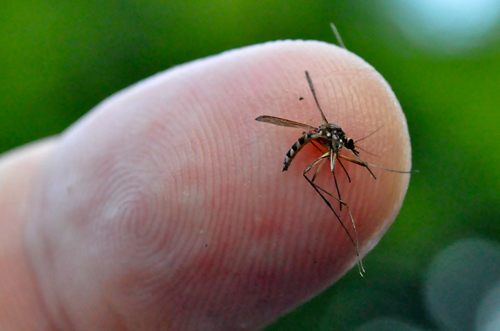Health Column: Mosquito myths get debunked

It’s time to set the record straight on the laws of attraction — for mosquitoes, that is.
Contrary to popular belief, there is no ingestible remedy one can take to repel the little buggers.
Scientific studies have shown that, despite miraculous claims, consuming vitamin B, Listerine, bananas or even garlic will do nothing to keep the vampire bugs away, said Dr. Scott Campbell, a public health entomologist with the Suffolk County Health Department.
The attraction actually lies in the skin chemistry of a human being, he said.
“Everyone gives off volatiles — oils that evaporate — and they are picked up and sensed by mosquitoes,” he said. “Some people exude volatiles that are more attractive than others.”
Those volatiles are almost like a perfume of sorts, which ends up attracting female mosquitoes — the blood-lovers of the two sexes. Males tend to feast on plants, according to Smithsonian Museum researchers.
And while studies have not confirmed edible options for repelling mosquitoes, there are certain scents that can actually attract them — ones you wouldn’t expect.
If you have stinky feet, eat stinky cheese or drink beer, female mosquitoes likely won’t be far behind, as these scents actually attract the species.
According to researchers with Cambridge University, mosquitoes are specifically attracted to Limburger cheese — or, more particularly, the scent of chemicals released by bacteria in the cheese.
The cheese flaunts the same bacteria found on human feet, according to the study.
As for the beer, the ethanol content in sweat increases with alcohol consumption, as does sweat production itself, according to a study done by the American Mosquito Control Association. The more people sweat, the more volatiles they emit, the study states.
The only repellents scientifically proven effective in keeping mosquitoes at bay are sprays containing DEET, Picaridin, oil of lemon eucalyptus (or its synthetic version, called PMD) and IR3535, according to the Centers for Disease Control and Prevention.
Just look at product labels for these ingredients.
Those in search of the most natural remedy options should consider using oil of lemon eucalyptus or using a product made with Picaridin, Dr. Campbell said.
These products can be applied only to one’s clothing, if preferred. “You can create a barrier without putting anything on your skin,” he said.
This will help to protect you from itchy bites and mosquito-borne diseases.
Unlike ticks, which can carry disease-forming pathogens in the gut, mosquitoes carry such pathogens in their saliva — so if you are bitten by an infected mosquito, a transfer of pathogens has likely already happened, explained Dr. Campbell.
And have no fear of stopping those clingers dead in their tracks.
“There is no evidence that killing a mosquito while feeding injects anything into the body,” Dr. Campbell said. “By the time they are feeding, the saliva has already entered the wound.”
A well-known mosquito-borne illness in this area is West Nile virus, which mosquitoes pick up from feeding on infected birds.
West Nile virus was first detected in Suffolk County in 1999 and can be found in crows, blue jays, hawks and American robins.
So far this season, only a single American robin, found June 16 in Selden, has tested positive for the virus countywide.
To report mosquito problems or stagnant pools of water, call the county Department of Public Works’ Vector Control Division at 631- 852-4270.
 Got a health question or column idea? Email Carrie Miller at [email protected]. Follow her on twitter @carriemiller01.
Got a health question or column idea? Email Carrie Miller at [email protected]. Follow her on twitter @carriemiller01.






